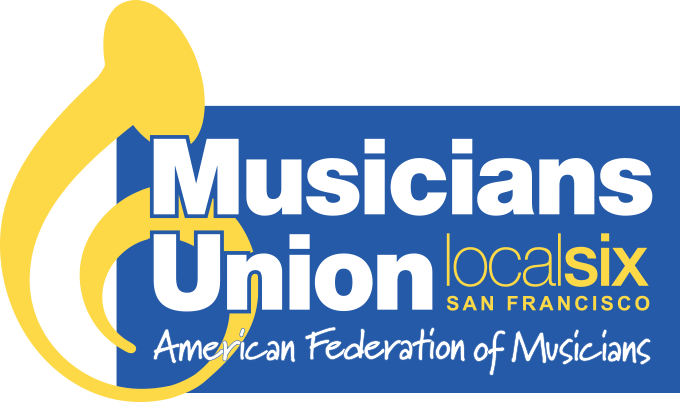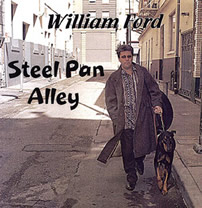“Everyone loves the sound of a steel drum,” says Bill Ford. “I happened to hear it and loved the sound like everyone else.” Max, Bill’s seeing-eye dog, sits quietly at his feet. Bill rubs his neck. Max yawns.
Bill Ford has been a bandleader in the Bay Area for the past twelve years. Like many musicians, he plays all kinds of gigs, from the backyard barbecue to the corporate event. Bill’s focus is original compositions, mixing the styles of Brazilian, Caribbean, R&B, bebop, straight-ahead, and funk, into his own brand of jazz steel drum. “Steel drum is the voice of what I’m doing,” he says.
Born in Passaic, New Jersey, Bill started playing drum set when he was 12 years old though he had no formal music education until he was 19. At age 21, he began studying classical jazz piano. “Piano is the basis of it all. So many top musicians say the same thing. You have to know the piano.” In his mid-twenties, Bill attended William Paterson University in Wayne, New Jersey, 30 miles outside of New York City. He joined the Percussion Department where he studied 20th century percussion music, relishing in the works of composers like John Cage. “This type of music prepares you for any situation,” says Bill.
Bill made the transition from side-musician to bandleader out of necessity. He has retinitis pigmentosa, a genetic condition that gradually deteriorates his vision. Little by little, Bill lost his peripheral vision — and his ability to drive — and these losses had a huge effect on his music.
“Steel drums became a blessing in disguise. Playing a drum set, I’m no longer the leader. With steel drum, I’m the leader. I’m able to coordinate the rides as part of the gigs and still function on the instrument — and I only have to carry one drum. If I’m doing drums on a pickup gig, I’m responsible (for the equipment). How am I going to get to the gig with a five-piece drum set?”
“Steel drum is really a piano combined with the drum, because you have the round concave metal instrument hit with mallets, which makes it the percussion instrument. But then you have all the notes in a circle of fifths…inside, with all the octaves next to each other. The steel drum of today evolved in the Carribean Island of Trinidad from oil barrels left from World War II. They started hitting those things back in the late 40’s. Now that barrel is tuned like a piano and played all over the world.”
Like the guitar and saxophone, the steel drum has had to earn its way into jazz. When Andy Narell released his jazz steel drum album Hidden Treasure in 1979, Bill heard the call. He began to blend the steel drum into a more traditional jazz setting. “I play often with a guitar duo, vibraphone duo, or piano duo, and build a trio out of that,” Bill explained. “I try not to play typical cliché steel drum. I’ll play the same material at a jazz club like Yoshi’s as I would at a corporate barbecue. I tell agents to try to sell steel drum because people aren’t aware that you can get a good party sound even in January. The music’s still good. It doesn’t have to be reserved for the Caribbean theme party.”
Bill is a member of Local 6 and works through the AFM Musicians Referral Service, the Union’s in-house booking agency. He joined the Union in the mid-seventies in New Jersey and rejoined in the early nineties when he moved to The City. Bill stated, “I think the Union is beneficial — and if every musician joined, it would be more beneficial.”
As a bandleader, Bill has had to improve his business skills over the years. “I used to think: it’s so hard to get musicians together! If you have money to pay musicians for a gig, you can have them. And, of course, the better the gig, the better the musicians you can hire.” And his musicians must be dog lovers, because Bill and Max are a package deal.
Bill explains that it is a bit of a trick to book a gig and show up with a dog, but he’s never had anyone decline. “Usually it’s the other dog that will go nuts,” he says. “My dog’s the one just sitting there going, `What’s the hassle?’”
Life as a musician, as in all of the arts, is full of uncertainty, but Bill takes it in stride. His philosophy is that it’s worse to force yourself to be a full-time musician at the expense of your creativity than to take work in another field to help support your artistic endeavors. As he says, “I’d rather work in a retail shoe department than do some of the gigs that a musician is called upon to do.”
Following that philosophy, Bill is moving forward. He is continuing his study of composition. And, last year, he picked up the tabla, the hand drums used in the classical music of India. On his gigs, he continues to focus on his original compositions.
Bill still has family and business contacts on the East Coast, and though he could easily move back, he plans to stick around. “The Bay Area has been great,” he says. “Who doesn’t love the Bay Area?”
Look for his debut CD, Steel Pan Alley, online at www.Panjazzmusic.com. Bill is currently performing in Japan for the summer of 2002.

